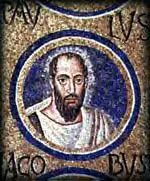
I.The Pauline Connection
A.Formation of the Gospel
The notion that there was "a Gospel" per se, that the message about Jesus was distinctive from the one about the Messiah, that Jesus gave it a kind of life of its own, was also slow in coming. The first real formation of it was the Apostle's Church council which we find in Acts . Before this time emphasis was upon Jesus as Messiah. Now Jesus did not cease to be the Messiah, but the church's vision of what that means in terms of the mission to the gentiles and something more than just liberation of Israel from the Romans began to dawn upon them at that council. The Word preached in Antioch, by Hellenistic Jews, the first to be called "Christians." The Antioch church knew their traditions independently of the Apostles. The Creedal formula Paul quotes probably came out of this this council.
B. The Antioch Community as connecting link
"The creedal formula quoted in 1 Cor 15: 3-7 in which the "gospel" is defined as the death, burial, resurrection, and appearances of Christ make it possible that the understanding of the Gospel shared not only by the Church of Antioch from the very beginning but also by others who are named in the citation of those to whom Jesus appeared (Peter and James). This is confirmed independently in Paul's report about the Apostle's council" (Gal 2:1-10).(Koester p. 51)
"What Paul preached was never the subject of the controversy between Paul's Gentile mission and the church in Jerusalem. Jesus death and resurrection was the common event upon which their proclamation was based. Through the proclamation of this eschatological event the communities of believers became the New Israel. As new Believers came into the community they were baptized in the the death of Jesus so they would share also in Jesus' Resurrection." (Ibid.)
In other words the Antioch community didn't just Preach Paul's doctrine, they already had the basic core of the Gospel which they knew from their migration form Jerusalem. They knew the cross and the Resurrection from the beginning. Clearly they located these events in history, in their own recent past as did the Jerusalem church. This will be seen shortly.
C. The Peter and James Connection.
Paul had several opportunities to Meet Peter and James, perhaps even other Apostles or those who saw Jesus in the beginning. He knew the stories to some extent, although perhaps not all of them and not well. But he clearly grounded himself in Jesus teachings. The creedal formula which he quotes places Peter and James in the thick of the action, ignoring the women witnesses of the Gospel (probably because they were women) and only counting these two men as early witnesses. Yet this was circulating during their life time. Peter and James knew this talk of Jesus resurrection and themselves as witnesses was being noised about the very city in which they lived. They clearly did nothing to hush it up! Why would they have no issues with Paul's basic message if that message was that Jesus was not an historical figure? The creedal statement says: "For what I received I passed on to you as of first importance: that Christ died for our sins according to the Scriptures, that he was buried that he was raised on the third day according to the Scriptures, and that the appeared to Peter, then to the Twelve..."
Why would an ethereal spirit require burial? Clearly the passage is speaking of events that occurred in space and time as we know it, in our world, involving flesh and blood historical figures. Paul knew those who were involved in the events and they had no problem with his understanding of those events or the core message.
D. Pauline References.
First, there is no reason for Paul to include such references since the epistles are not an attempt to convert pagans, but letters to churches dealing with practical and theological matters. Secondly, Paul was an intellectual, a thinker and a theologian. His concern was theology. He sought to answer the hard questions about the faith which were not answered by mere repetition of the basic facts of Jesus life. Why should he go into detail about Mary and Joseph and Christ born in a manger when he had more lofty matters to deal with? Finally, he wasn't present during the ministry of Jesus and he was not an eye witness, it is doubtful that he he ever saw a copy of Mark, or any of the other Gospels, so he may not have known all the facts or all the sayings. But he knew enough to formulate a theology. Granted it is a lofty theology, he does have something of a "cosmic Christ," but Paul's Christ is not a Gnostic redeemer, and Paul does demonstrate many times a basic awareness of the core Jesus story. But we should not expect to find it in great detail. This is argument from Silence and proves nothing. I will argue that not only do we find many direct contradictions to Doherty's views, that the Gnostic redeemer myth is bunk, and that Paul saw Jesus was a flesh and blood man who lived in history, but that some traces of the Gospel theology and material come through in Paul's understanding.
See my Chart showing Paul's allusions to Gospel stories and saying of Jesus. Koester believes he had a saying source, such as Q.

No comments:
Post a Comment